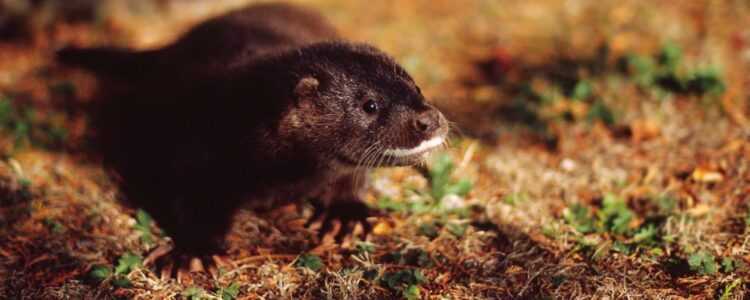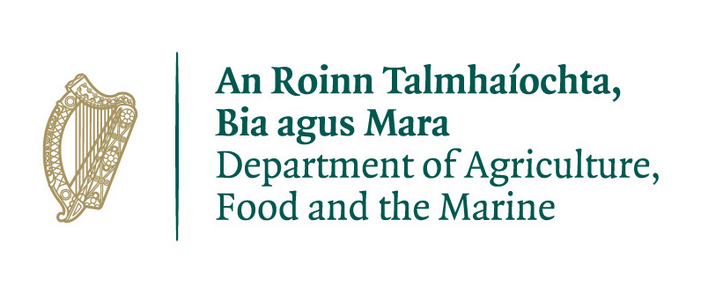
Otter
Eurasian Otter - Lutra Lutra
The Eurasian otter is in decline everywhere in their traditional home ranges except in Ireland where the densest population now exist. Most populations of otters in Europe are listed as being vulnerable, in decline or extinct making the Irish population all the more important. The practice of hunting and trapping is now banned but the destruction of their habitats, human disturbance and falling water quality levels are a threat to the Irish otter population. If cubs are born in winter or early spring mortality rates are high.
Man is the main cause of otter death due to increased road traffic and the accidental drowning of coastal otters in lobster pots and fish nets. Dogs also account for a number of otter cub deaths each year. Otters can cause damage to fish hatcheries and farms so adequate fencing is needed in such areas.
Interestingly, the available information on otter-mink dynamics in GB seems to indicate that mink have declined in areas where otter numbers are recovering – ie food/habitat competition in otters’ favour. Reflecting its importance the Eurasian otter is a protected species under Irish, EU and international legislation.
Otter Crimes
Otters are protected by law in the Republic of Ireland under the Wildlife Acts 1976 to 2012.
They are also protected under the Bern Convention (Appendix III) and EU Directive 92/43 Annex II, Annex IV
Unless authorised to do so under a valid licence/permission/derogation granted by the Minister for Arts, Heritage and the Gaeltacht under the Wildlife Acts 1976 to 2012 it is unlawful to:-
- Hunt or kill (or attempt to do so) an otter
- Wilfully interfere with or destroy an otter holt (its breeding and resting place)
- Possess an otter, whether alive or dead, or any part, product or derivative thereof other than one lawfully taken pursuant to the Wildlife Acts
- Sell, keep or offer for sale, or engage in taxidermy in respect of an otter or any parts, products or derivatives thereof other that by a licensed wildlife dealer with a lawfully acquired specimen
SNARES
Otters are sometimes trapped illegally with wire snares. Even when they are the unintended target the consequences for them can be fatal. The snare lodges around the neck and they may even get a front leg through as well but all too often they are snared around the abdomen just in front of the pelvis.
An otter is a strong animal and will put up a huge struggle when snared, often lasting for days until it dies from injury and exhaustion.
Wildlife Licensing Unit,
National Parks and Wildlife Service,
Department of Housing, Local Government and Heritage
National Parks and Wildlife Service
90 King Street North
Dublin 7
D07 N7CV
Email: wildlifelicence@npws.gov.ie
Call: 01 888 2000
Recording evidence at the Crime Scene
Assessing whether a criminal offence has taken place may not always be straight forward and other possibilities such as natural deaths, predation and legal hunting should be considered.
If you come across a wildlife crime scene or a dead bird or object that may be related to a wildlife crime, every piece of information is – or might be – important, but it needs to be recorded properly and accurately for the authorities to have a chance of prosecuting an offender.
Before you do anything else it is very important that:
- You do NOT put yourself in danger by approaching anyone you suspect of committing a crime – they may be violent and/or aggressive.
- You do NOT touch any dead birds or animals. They may be poisoned baits or victims of poisoning. Many poisons (e.g. Carbofuran) are extremely dangerous to us as well as wildlife in even very small amounts and can be absorbed through the skin.
- You do NOT disturb the scene by walking around unnecessarily – small pieces of evidence (cigarette ends, footprints, the marks left by a spade etc) may be lost or trampled into the mud or grass.
- You do NOT move any items at the scene – unless asked to do so or an animal or human”s welfare is/may be compromised by leaving it at the scene.
- You do NOT mark the site (e.g. with a white plastic bag) Although being able to see a marker from a distance might sound like a good idea, it will also alert an offender that someone has been at the site and they might go back and remove evidence.
- You do NOT do anything illegal yourself – leave crime to the criminals!
Record the date and time
- Record the transport
Do this as soon as possible, as suspects can be traced from the registration number
Photograph/write down any vehicle registration numbers that are or might be related to the incident. It is legal to record a registration number if you suspect that the vehicle has been or may be used in a crime. - Record the person
Recording the offender’s face is important of course, but their clothing, the bags they’re carrying, the equipment they’re using are all important too. - Record the scene
Take photographs or video of the scene using a mobile phone or camera etc (or make as accurate a sketch as possible). - If possible try to cover any items, perhaps with vegetation, to make them safe; but make sure you don’t disturb the crime scene in the process!
- If photographing an object, try to put something beside it for scale (e.g. a coin or notebook) providing it won’t disturb the crime scene.
- Record the location
It is particularly important to record locations accurately (apps that provide GPS data are available for most smartphones)
In an urban area note the address or a description of the location. In the countryside take wide angle photographs of any landmarks; a tree, a distinctive fence line, a hill. - Even if in doubt take a photograph and email it to the National Parks and Wildlife Service WildlifeEnforcement@npws.gov.ie
Reporting an otter crime
To report suspected illegal otter activity contact the National Parks & Wildlife Service
Tel: (01) 888 2000
Contact numbers for your local NPWS Conservation Ranger HERE
If you can’t reach NPWS personnel call An Garda Síochána:
If the crime is in progress or about to happen, or if the offender is still at the scene or has just left call 999 or 112
If the event is finished then contact the National Bureau of Criminal Investigation on envi.wildlife.crime@garda.ie and call your local Garda Station (Garda Stations Directory) or the Garda Confidential Telephone Number 1800 666 111
[Although it will assist the NPWS and Gardaí if you provide as much information as possible, you do not have to give your name if you ring to report an incident.]
| If the otter is alive and is injured, also call a wildlife rehabilitator/vet from the contacts page of Irish Wildlife Matters | Irish Wildlife Matters |
For more information on reporting a crime click HERE
